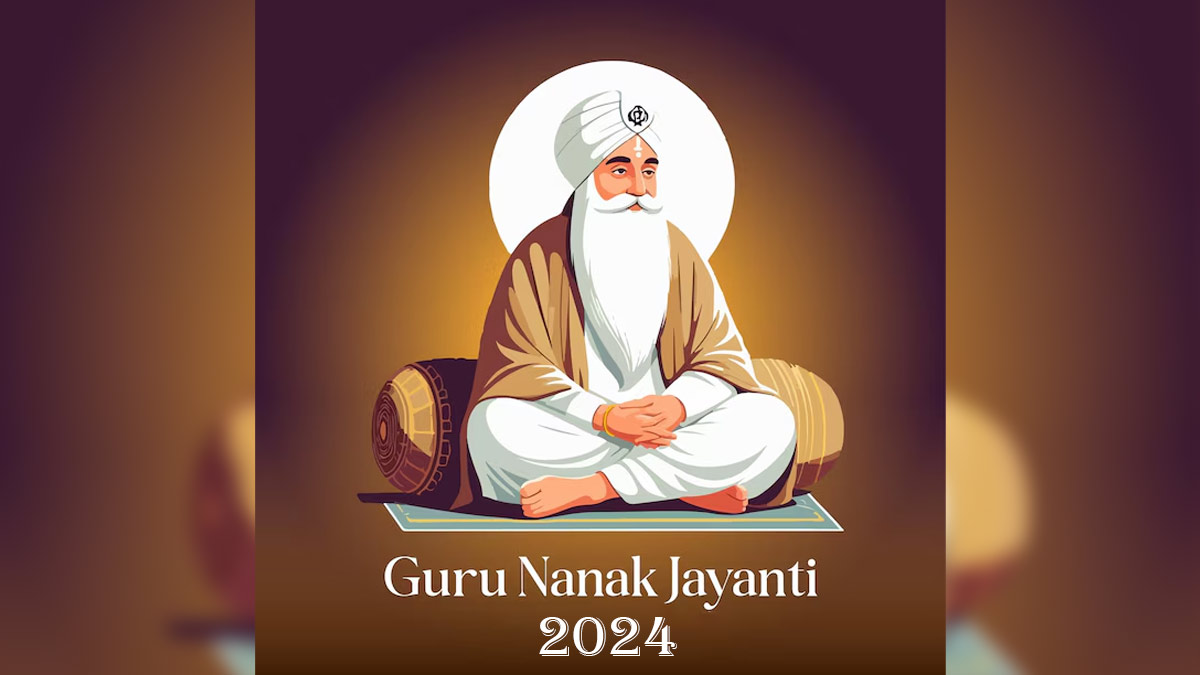Guru Nanak Jayanti 2024: Date, Time, History, and Significance (GS Paper 1, Arts & Culture)

Context
- Guru Nanak Jayanti, also known as Gurpurab or Guru Nanak Prakash Utsav, is one of the most significant festivals for Sikhs around the world.
- It marks the birth of Guru Nanak Dev Ji, the first Sikh Guru, and is celebrated with great devotion, respect, and joy.
- In 2024, the day will be especially momentous as it marks the 555th birth anniversary of Guru Nanak.
Guru Nanak Jayanti 2024 – Date and Timings
Guru Nanak Jayanti falls on Friday, November 15, 2024. The celebrations are based on the Purnima Tithi (full moon day), which holds special importance in Sikhism. This year, the key timings are as follows:
- Purnima Tithi Starts: 6:19 AM on November 15, 2024
- Purnima Tithi Ends: 2:58 AM on November 16, 2024
History of Guru Nanak Jayanti
- Guru Nanak Dev Ji was born on April 15, 1469, in the village of Talwandi, which is now known as Nankana Sahib in present-day Pakistan.
- He was born into a Hindu Khatri family to parents Mehta Kalu and Mata Tripta.
- From an early age, Guru Nanak exhibited a deep spiritual curiosity and challenged the prevailing religious and social norms of his time.
- At the age of 30, Guru Nanak experienced a profound spiritual awakening, which transformed his life.
- He disappeared for three days, during which he is believed to have had a divine experience.
- Upon his return, he preached the concept of oneness of God, stating, "There is no Hindu, there is no Muslim; humanity is one."
- His teachings emphasized unity, equality, and the importance of selfless service.
- Guru Nanak rejected the rigid caste system, the divide between different religions, and the inequalities prevalent in society.
- He encouraged people to embrace the values of love, compassion, and respect for all living beings.
- His key message was that all people are equal, regardless of their faith, background, or social status.
Why Guru Nanak Jayanti is Significant?
Guru Nanak Jayanti is not just a celebration of Guru Nanak’s birth but also a reminder of his profound teachings, which resonate across cultures and religions. His values of universal brotherhood, tolerance, and respect for diversity are more relevant than ever in today’s world.
The significance of the day lies in:
- Spreading Unity and Peace: Guru Nanak’s teachings transcend religious boundaries, making this day a global reminder of the importance of unity, peace, and coexistence among all people.
- Promoting Equality: Guru Nanak was a champion of equality and justice, particularly for marginalized groups such as women, the poor, and the lower castes. His legacy continues to inspire movements for social justice and human rights.
- Emphasizing Selfless Service: Guru Nanak emphasized the concept of seva (selfless service), encouraging people to serve others without expecting anything in return, fostering a sense of community and compassion.
Rituals and Celebrations of Guru Nanak Jayanti 2024
Guru Nanak Jayanti is celebrated with a series of religious, cultural, and community-based activities. These rituals not only honor the Guru’s teachings but also emphasize the Sikh values of service, humility, and spiritual devotion.
- Nagar Kirtan Processions: One of the most visible and joyous events of the celebrations is the Nagar Kirtan, a procession where Sikhs sing hymns (kirtan) from the Guru Granth Sahib, their holy scripture, as they move through the streets. The procession is usually led by the Palki (palanquin) carrying a copy of the Guru Granth Sahib, symbolizing the Guru’s spiritual presence.
- Akhand Path: In the days leading up to Guru Nanak Jayanti, many Gurdwaras (Sikh temples) conduct an Akhand Path, a continuous, uninterrupted reading of the Guru Granth Sahib, which lasts for 48 hours. The reading is a form of devotional practice and is a way of invoking the blessings of the Guru.
- Kirtan and Katha Sessions: Devotees gather at Gurdwaras to listen to Kirtan (devotional singing) and Katha (spiritual discourses) that recount the life, teachings, and miracles of Guru Nanak. These sessions help to deepen the understanding of Guru Nanak’s philosophy.
- Langar Seva (Community Kitchen): One of the most significant features of Guru Nanak Jayanti is the Langar, or community kitchen, where free meals are served to everyone, irrespective of their background. The practice of Langar is a key aspect of Sikhism, reflecting the teachings of equality, service, and the sharing of resources. Volunteers (Sevaks) prepare and serve food as a symbol of selfless service.
- Gurbani Recitations and Prayers: Special prayers, known as Ardas, are recited in Gurdwaras to express gratitude to the Guru and seek blessings for peace and prosperity. These prayers are a means of connecting with the divine and reaffirming the Sikh commitment to living by Guru Nanak’s teachings.
- Kar Sewa (Voluntary Service): Sikhs also participate in Kar Sewa, or voluntary community service. This could include cleaning Gurdwaras, helping the elderly, or participating in social welfare activities, embodying the Guru’s principle of serving others with humility.
Guru Nanak Jayanti’s Global Impact
- Guru Nanak Jayanti is celebrated not only in India but by Sikhs around the world.
- The teachings of Guru Nanak have had a profound influence on the Sikh community globally and continue to inspire people of all faiths and cultures.
- This day fosters a spirit of unity, compassion, and understanding, reminding humanity of the importance of religious tolerance and social justice.
Conclusion
- Guru Nanak Jayanti 2024 holds special significance as it marks the 555th birth anniversary of Guru Nanak Dev Ji, a visionary leader whose teachings of love, equality, and selfless service continue to guide millions of people across the globe.
- The day is an opportunity for Sikhs and others to reflect on Guru Nanak’s timeless wisdom, celebrate his life and legacy, and reaffirm the values of compassion, peace, and unity.


